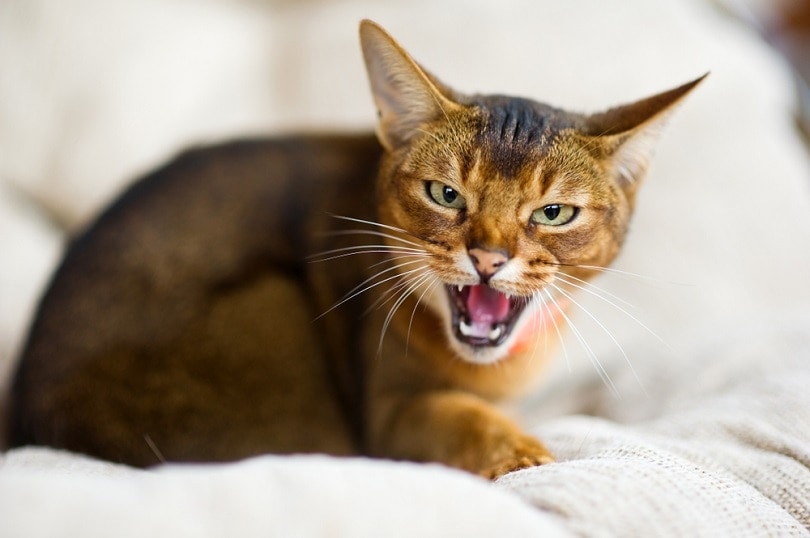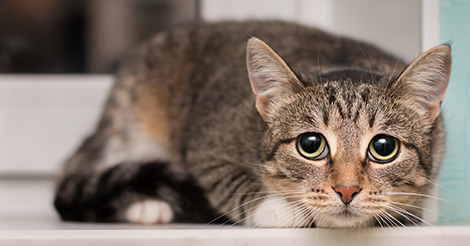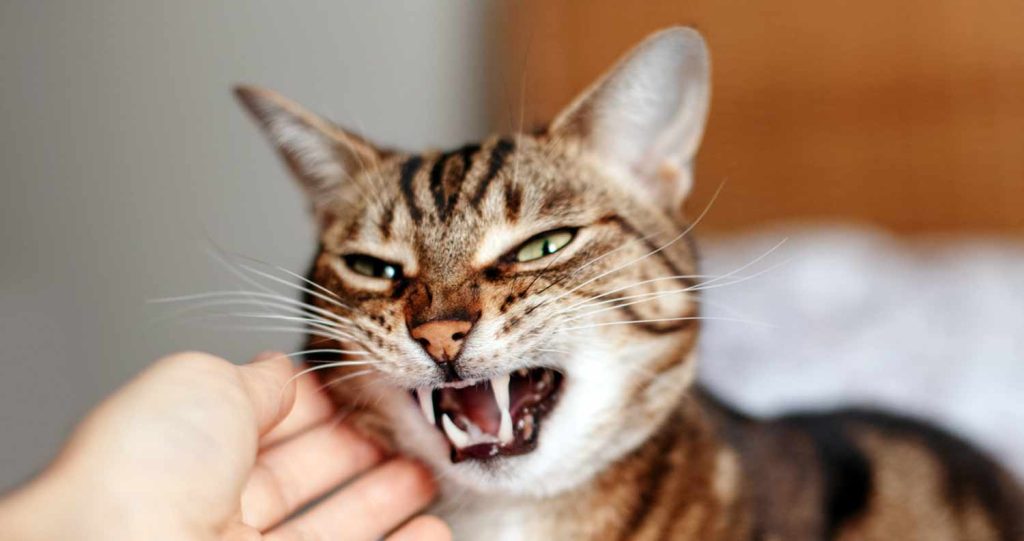Stress is a disease that affects both humans and animals today. The cat is an animal that appreciates stability, routine and regularity. The slightest change can be a source of concern, when the anxiety is not the consequence of an illness! Find out how to identify the symptoms of stress in order to act quickly if your little furball is concerned.
Table of Contents
How does stress manifest itself in cats?
Each cat has its own personality and can show stress in different ways. Several types of symptoms are observable, depending on the character of your animal:
Growing aggressiveness :
If your cat is used to being calm and docile, stress may cause it to become aggressive. In this case, he can start spitting or hissing, biting, scratching, refusing contact or even raising his hair for no apparent reason. His pupils are often dilated and fixed.

Increased anxiety :
The stressed cat is generally anxious. He is afraid of the slightest noise, he develops phobias and he can react by modifying his behavior suddenly. This anxiety can lead him to self-harm by biting himself or pulling out tufts of hair, but he can also ingest any type of object, which is very dangerous.
Frequent meowing :
A cat communicates a lot by meowing. The long and loud meows, rather serious, are often signs of stress.
Compulsive licking :
When he feels stressed or depressed by boredom, the cat tends to lick compulsively, mainly the paws. If he also licks his belly or tail when you touch him, it may be stress. This behavior can lead to mass loss of hair in licked areas and irritation resulting in crusting.
Incontinence and uncleanliness :
The stressed cat generally begins to relieve itself outside the litter box. To show his discomfort, he tends to urinate where you can see him.
Marking by claws :
Disturbed, the stressed cat has the feeling of no longer controlling or recognizing its environment. He needs to mark it and then he starts scratching the tall furniture and the walls vertically.
The development of infectious diseases :
When stressed, the cat’s body secretes hormones that disrupt the proper functioning of white blood cells, which are the cells that protect the body. His immune system is thus more vulnerable and prone to the development of infectious diseases. If these are repeated, it may be chronic stress.
Eating disorders :
In the face of stress, the cat can present radically opposite eating disorders. Some will lose their appetite and refuse to eat. Others won’t be able to stop themselves from eating compulsively and throwing up everything immediately.
The appearance of OCDS (obsessive-compulsive disorder):
The fearful and stressed cat can develop OCDS, such as sudden and repeated hyperactive behavior, constantly renewed gestures, it can remain motionless for hours, chase its tail or touch an object for several minutes.
The refusal of caresses :
The stressed cat very often tries to flee the contact, in particular the caresses. If you insist, he may be aggressive and warn you by pointing his ears back.
What causes stress in cats?
Identifying the cause or causes of stress in cats can take time. However, it is important to seek them out, as only their resolution will help your pet feel better.
If the causes can be many and varied, here are the most common:
Cohabitation between several cats :
The cat likes to have its territory and its habits. If he has not been used to it, he does not appreciate cohabitation with other individuals.

The arrival of a new animal or a baby in the home :
The cat may feel disturbed if a new “intruder” enters its territory and settles there.
Receiving guests :
The presence of guests in your home disturbs your cat’s natural territory. Some may experience it badly and stress, isolate themselves or be aggressive.
The change of territory :
Your cat identifies itself thanks to its territory which must be reassuring to it. When there is a change, such as a move or a temporary caution in your absence, it can express stress. The same applies to any disturbance within its territory, such as works or redevelopment, etc.
A change in food :
The cat appreciates food regularity. Thinking of pleasing him by varying his menus is a mistake; on the contrary, it reinforces his anxiety. Give him quality food, mainly in the form of kibble and do not change it if it suits him.
Poor food distribution :
The cat appreciates several small rations a day. If you only feed him once or twice a day, he may start stressing out for fear of running out.
Transport by car :
Your cat may have difficulty supporting transport by car. This disorder can be explained by motion sickness or by the association of these journeys with an unpleasant event, such as a visit to the veterinarian.
An illness :
Stress can also be the consequence of an illness or suffering.
What are the consequences of stress in cats?
The cat may feel a natural transient stress following one of these disturbances. This is nothing to worry about. However, if you notice that these situations and these behavioral problems are repeated and that your animal seems to live in a feeling of permanent worry or anxiety, it is important to quickly consult the veterinarian.
The bladder is a leading organ in the event of stress, hence the frequent behavior of uncleanliness. Chronic stress can thus promote the development of urinary disorders. Moreover, due to the overproduction of cortisol in the body due to stress, the cat’s immune system becomes more fragile and susceptible to infectious diseases.
As you will have understood, letting stress set in is dangerous for your pet’s health. It is important to quickly find a solution to relieve it, before the disorder is too deeply established.

How to relieve stress in cats?
When you notice the first symptoms of stress in your cat, consult the veterinarian without delay.
First, the veterinarian will make sure your cat is not sick or injured. If he is in good health, then he will suspect a behavioral origin.
Your veterinarian can then help you find the sources of your cat’s anxiety, or refer you to a veterinary behaviorist. This approach helps to put in place appropriate measures or treatments to relieve stress.
A treatment based on natural food supplements or calming pheromones can be put in place to reduce your cat’s anxiety. If your veterinarian deems it necessary, he can prescribe drug treatments.
The right things to do
At the same time, we advise you to take the right steps to reduce your pet’s stress, or at least not make it worse.
- Give several small portions of food a day if the anxiety is food-related. Be regular and always present the same food to him, preferably of quality in order to cover his daily nutritional needs.
- Do not punish him when he shows his stress so as not to aggravate it.
- Always provide him with fresh water to mitigate any urinary risks.
- Leave games, scratching posts, places to hide and to perch high up at their disposal.
- Take the time to play with him and devote time to him, whether he is alone or stressed by the arrival of a new animal or a baby.
Give your pet time to adjust to each change. Be patient and go slowly to avoid upsetting him.